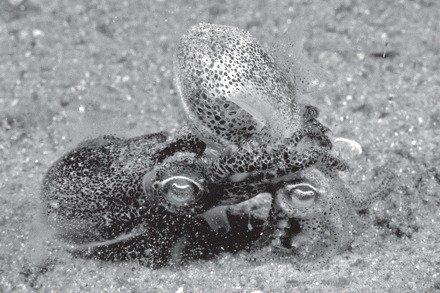Study: After three-hour sex, squid are left too exhausted to fight for survival
Sexually promiscuous dumpling squid in the midst of mating.
If you ever wondered about the post-coital habits of squid, today is your lucky day.
It turns out that squid are a lot like humans, except for a few minor details like their customary three-hour athletic sexual abilities.
Scientists of the University of Melbourne collected dumpling squid from the wild and forced the squid — both males and females — to swim to exhaustion in a flume.
According to this article in the Los Angeles Times, the researchers then allowed the squid to mate, and performed the same swimming experiment.
This is what happened: after sex, both males and females could swim only half as long as normal. If they were allowed 30 minutes of recovery time after sex, however, they could swim normally.
So far, this is hardly shocking information, considering squid mating sessions last up to three hours and are apparently extremely vigorous.
It gets a bit more complicated with squid sex though.
This is how their mating works: The male squid restrains the female, pumping jets of water into her mantle and jet, releasing ink and changing color repeatedly.
The physical activity cannot be sustained by aerobic metabolism alone and generally requires anaerobic metabolism, which produces lactate — an important agent of muscle fatigue.
That alone wouldn’t be so bad, if dumpling squid didn’t live under water and were not — at only three inches — too small to scare off predators.
The Australian researchers concluded in their study in the journal Biology Letters that post-coital exhaustion might limit their search for food and leave them more vulnerable to predators.
After sex, they simply become too lazy to care.
Scientifically speaking, the energetic costs of mating for three hours underwater clearly aren’t worth it in the end.
The story you just read is accessible and free to all because thousands of listeners and readers contribute to our nonprofit newsroom. We go deep to bring you the human-centered international reporting that you know you can trust. To do this work and to do it well, we rely on the support of our listeners. If you appreciated our coverage this year, if there was a story that made you pause or a song that moved you, would you consider making a gift to sustain our work through 2024 and beyond?
